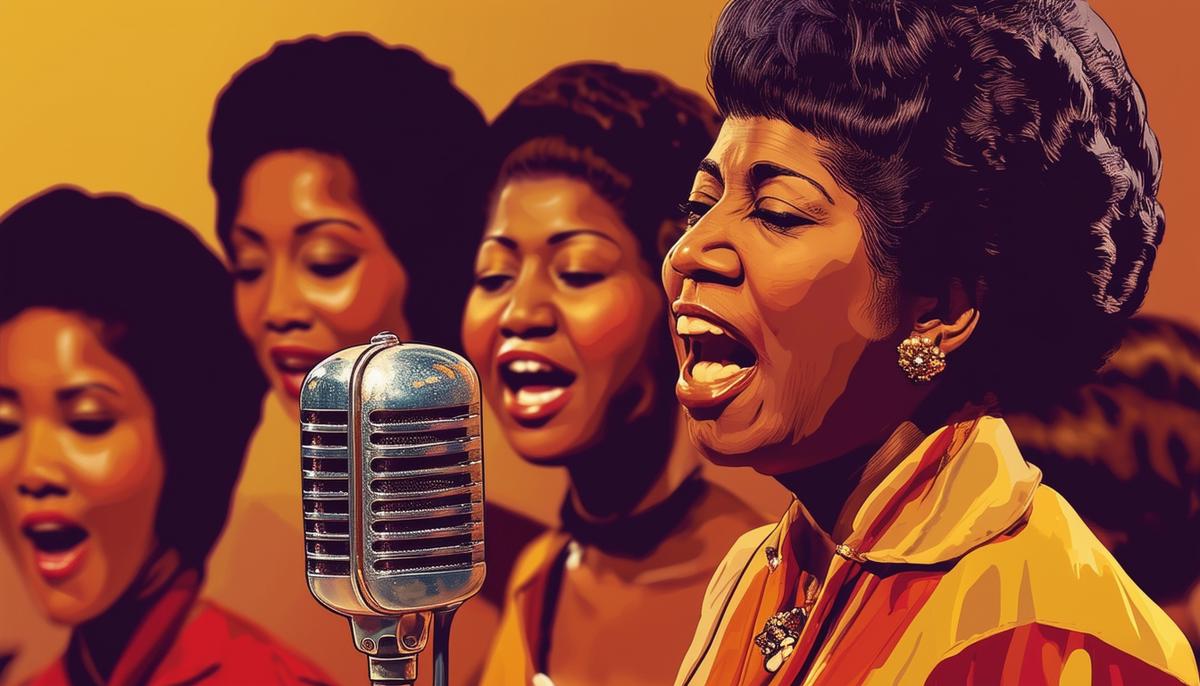Transformation of 'Respect'
Aretha Franklin's "Respect" is a vibrant reinvention of Otis Redding's original. She flipped the script, turning a husband's homecoming anthem into a powerful statement of empowerment. Franklin's version demanded respect, speaking to women fighting for their place in society.
The lyrics underwent a significant shift:
- Redding's male perspective became Franklin's fierce call for equality
- "What you want, baby, I got it" she sang, declaring self-sufficiency
- Her version emphasized mutual respect in relationships
Franklin added layers with backup vocals from her sisters, creating an engaging call-and-response. The "sock it to me" line symbolized unyielding confidence. And who could forget that iconic spelling of R-E-S-P-E-C-T?
The late '60s were buzzing with change; civil rights movements and second-wave feminism were on the rise. Franklin's "Respect" became an anthem that aligned with the dreams and fights of many, resonating deeply with those tired of being sidelined.

Cultural Impact of 'Respect'
In the swirling kaleidoscope of the 1960s, "Respect" became a bright flag for gender and racial equality. Franklin didn't just sing the song; she embodied it, breathing life into every note and claiming it for the oppressed and unheard voices of her time.
Feminists and civil rights activists rallied around Franklin's powerful vocals. Women, particularly women of color, found a voice in Franklin's anthemic assertion of strength and self-respect, countering years of marginalization.
"It's a song written by Otis Redding, who is considered obviously one of the most iconic soul men of all time. But Aretha snatches the song away and reinfuses it with these second-wave feminist sensibilities." – Reiland Rabaka, Professor at University of Colorado Boulder
The feminist movement embraced "Respect" like a long-lost sister, with Franklin becoming their fearless spokeswoman. Women listened, emboldened, as she spelled out R-E-S-P-E-C-T—a bulletproof assertion of their rights.
The civil rights movement heard Franklin's anthem as a call to action. The song quickly became a fixture at rallies and protests, fueling the drive for equality and justice. "Respect" became a cultural connective tissue, binding together diverse communities all demanding to be seen and heard.
Franklin elevated "Respect" into a timeless classic that still rings true today. Whether it plays in films, on TV screens, or at karaoke nights, "Respect" lives on as a symbol of resilient empowerment—never losing its potency or meaning.

Recording and Release
On Valentine's Day 1967, Aretha Franklin entered the Atlantic Records studio to record "Respect." She was joined by legendary producer Jerry Wexler, whose vision melded seamlessly with Franklin's artistry. Franklin's sisters, Erma and Carolyn, added their own flair with backup vocals, layering the track with echoes of sisterhood.
When "Respect" hit the airwaves, it rocketed to the top spot on the Billboard Hot 100, a feat unparalleled at the time for a soulful female artist. Defying expectations and transcending racial barriers, Aretha's "Respect" was an immediate triumph.
The electrifying intro, with its punchy piano keys, wasn't just a song; it was an invitation to join a growing movement. The lyrics tapped into a universal desire for recognition and acceptance that resonated with every listener.
"Respect" became a cultural chameleon, adapting over decades to offer inspiration and empowerment through multiple mediums. It wove its harmonies into over 60 TV shows and films, proof of its timeless appeal.
As each generation discovers its rhythms, they find strength in knowing that Aretha's call for "Respect" remains as vital today as ever before.
Aretha Franklin's "Respect" remains a powerful anthem that transcends time, embodying the spirit of empowerment and change. Her transformation of the song into a call for dignity and equality continues to inspire generations, reminding us all of the enduring need for mutual respect.
- Lewis L. Interview on the cultural impact of "Respect". University of Detroit-Mercy.
- Wexler J. Quoted in Franklin A biography.
- Franklin A. Fresh Air interview. NPR. 1999.
- Rabaka R. The Hip Hop Movement: From R&B and the Civil Rights Movement to Rap and the Hip Hop Generation. Lexington Books; 2013.
